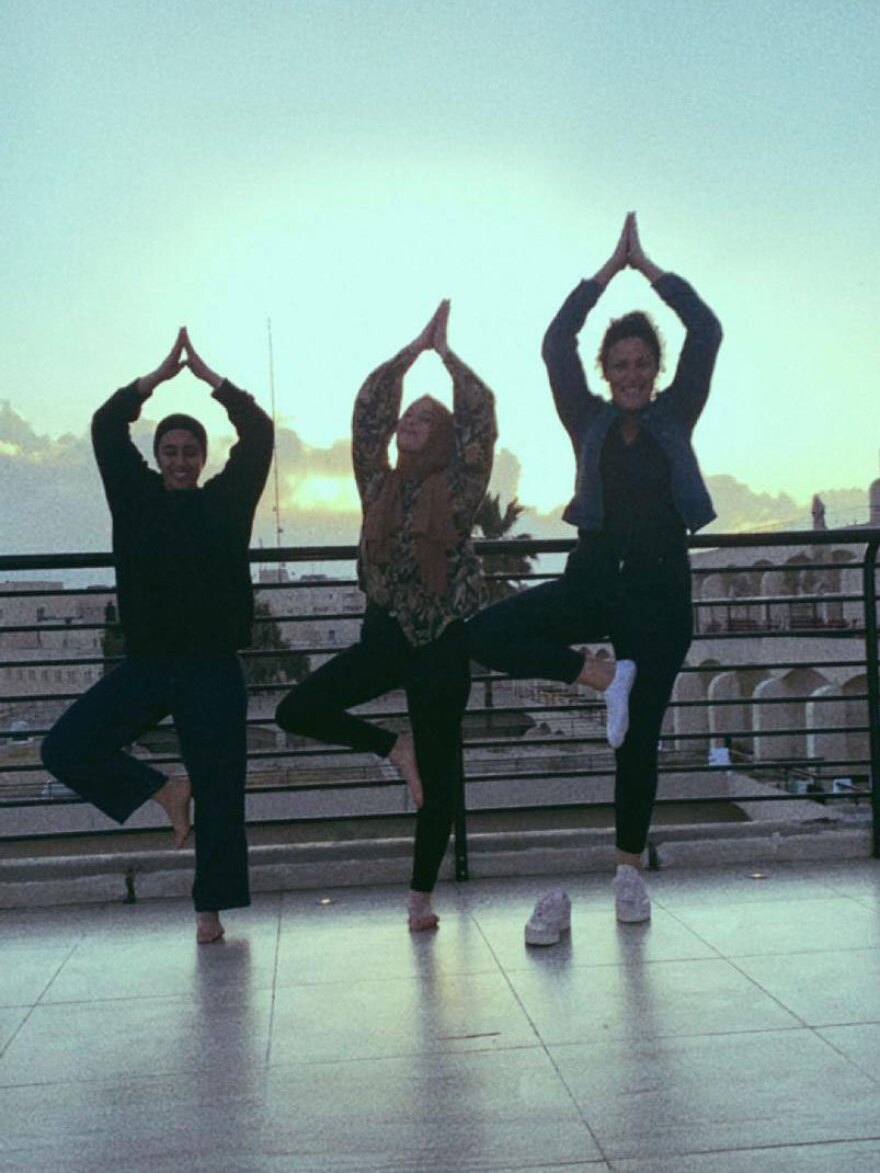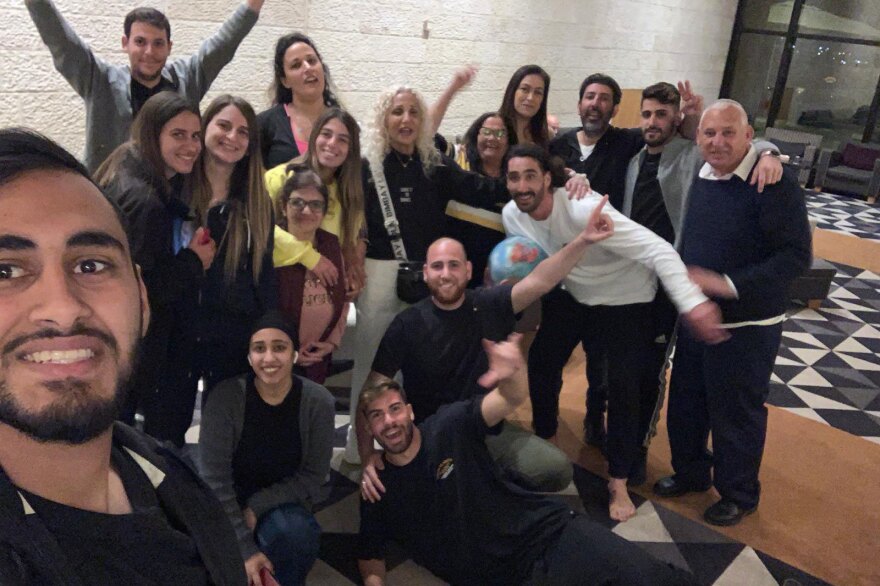Baruch Shpitzer, the reception manager at the Dan Jerusalem Hotel, prides himself on making tourists feel at home in his sprawling 9-story hotel and spa, built into a cliffside and featuring panoramic Old City views.
In March, though, his hospitality skills were put to the test. His reception desk was encased in plexiglass. His new arrivals were sometimes delivered by ambulance. None of them was staying at his hotel by choice.
"We speak to them to get them out from the shock that they're in when they're coming into the hotel," Shpitzer says.
The guests, as he called them, came from many walks of life — Israeli Jews, Palestinian Arab citizens of Israel, Palestinian residents of Jerusalem, religious, secular — but all had one thing in common: They were among thousands of COVID-19 patients the Israeli military quarantined in hotels throughout the country.
From mid-March through early May, the Dan Jerusalem hosted about 180 patients, all forced to live together until they were no longer infectious. They could only leave after they tested negative twice.
They called it the "Hotel Corona."
Most of the hotel's 400 or so employees refused to continue working there after the virus outbreak, but Shpitzer didn't hesitate.
"For me, it was simple," he says. "I knew from the beginning that I'm going to stay. There is a say[ing] in the hotel industry that it's also like a virus. If it catches you, it's very hard to go out." And so he waited every day behind his plexiglass-shielded desk, greeting each new arrival, assessing their needs and making room assignments.

The life the patients created together — shared widely on social media and picked up by the evening news — became the envy of the rest of Israel: Group sunbathing on the hotel deck. Rooftop yoga classes and Zumba sessions in the carpeted hotel lobby. Singalongs by the grand piano and room parties at night.
It was an alternative reality to the quiet and isolated world outside the hotel's double sliding doors, with everyone under lockdown at home.
It also became an accidental social experiment, for a time suspending the usual segregation in the country. Jews and Arabs, ultra-Orthodox and secular, tend to live separate lives in separate cities and study in separate schools. That is largely by government design, with ingrained inequalities and discrimination against Palestinian Arab citizens particularly acute. Hotel Corona offered a rare equal footing.
Most of the 22 hotels the military operated for recovering patients were reserved for ultra-Orthodox Jews, set up so patients would be willing to leave their insular neighborhoods, knowing they would be among their own kind. "Otherwise," says Brig. Gen. Yoram Lerdo, who oversees the quarantine hotels, "they will not come."
The Dan Jerusalem was one exception.
The very first COVID-19 guests to check in were 19-year-old Aysha Abu Shhab and her 21-year-old brother Mohammed. Both were employed as janitors at an Israeli hospital, where they'd been infected by the virus.
They roomed together, and as the hotel began filling with more patients, Aysha, who is Muslim, noticed everyone was sticking with their own kind at dinner. She wanted to branch out.
One evening, she scanned the hotel lobby, where guests ate their meals, and landed on a Jewish couple, Amram Maman, 66, and his wife Gina.

"They was laughing all the time, so I chose them," Abu Shhab says. Wearing a hijab, she sat down with Maman, wearing his kippah, and Gina. By the end of the meal, they were all laughing and singing "Inta Omri," ("You Are My Life"), a popular Egyptian song from the 1960s, still beloved in the Middle East.
Another day, as Abu Shhab was walking back to her room, she happened upon a young Orthodox Jewish man, collapsed in the carpeted hallway. He reminded her of the famous self-portrait of Vincent Van Gogh — gaunt, pale and bearded. He was having an asthma attack. She rushed to help him, but wondered: would he allow her to touch him?
"Like, I'm a Muslim. Maybe I cannot talk to him, I cannot touch him," she recalls.
But she did. And he did not object. It took time for medics to put on protective suits and enter the hotel, so they instructed her over the phone how to treat him. She wondered afterward if she might have helped save his life. An older Jewish nurse told her she'd done something great.

Noam Shuster-Eliassi, a comedian, was sent to recuperate at the hotel after catching the virus on her way back to Israel from the U.S. She'd been on a fellowship at Harvard University, writing her one-woman show, Coexistence My Ass.
In the hotel lobby, she performed stand-up for an audience of Jews and Arabs. She was worried that she was still too weak to be very funny, but told them her patient number was 3,555 — a lucky number.
"So I'm going to bring you my good luck with my number," she told them. "Hopefully, you'll get out of here."
But, she says, "They're like, 'no, we don't want to get out of here.' What are you talking about? 'We want to stay.' And I'm like, so who here is really sick and who here caught it on purpose, licking a bench outside in order to get in the hotel for free?"
Shuster-Eliassi, who is Jewish, told her jokes in Hebrew and Arabic, surprising the audience. She learned both languages growing up in a village called Oasis of Peace, where half the residents are Jewish and the other half Palestinian.
At breakfast the morning after her show, and then as the days went by, Shuster-Eliassi noticed the Arab and Jewish guests began intermingling more.
"I was like, wait, where is the racism?" she says. "Where's all the problems? Where's all the prejudice? Everybody's getting along here in this hotel. What's happening here?"
The biggest test of togetherness came in early April, when Hotel Corona had been operating for less than a month. Passover was approaching. The hotel management decided to open the banquet hall for guests to host their own Passover Seder.
The younger, non-religious Jewish guests wanted to film the Seder, but ultra-Orthodox Jews don't allow electronics on religious holidays. To avoid friction, the hotel divided the banquet hall so there could be two separate Seders. A floor-to-ceiling barrier was set up to separate the Orthodox Jews from the rest.
"It reminded me of the world that I'm used to before the corona," Shuster-Eliassi says. "It reminded me of our default — that we prefer separation rather than the compromise that comes with uniting."
Amram and Gina Maman walked in and saw the barrier. "I can't do the Seder like this. I'm going to cry," Gina told her husband.
"Give me two minutes," Amram replied.
He recruited some younger guests to help him move the barrier. An ultra-Orthodox man jumped up — not to protest, but to help move the wall into the corner.

Then, as one room, about 180 people in all, they blessed the wine and the Seder began — with Abu Shhab and other Muslims in the hotel celebrating with them.
Last month, the Dan Jerusalem was given a new mission: to quarantine COVID-19-positive arrivals from abroad.
Abu Shhab, Shuster-Eliassi and the other original patients who recovered were sent home. After her experience helping the man with the asthma attack, Abu Shhab decided to leave her janitor job and enroll in nursing school.
Those still infected were sent to other quarantine hotels. From behind the plexiglass, Shpitzer said goodbye to the last of those guests before preparing the hotel for its new arrivals.
When he first opened the doors and started assigning roommates, his fear was that people from different backgrounds would clash, but they did not. In fact, some became friends.
Still, he sees no need to repeat the experiment. A practical hotelier, Shpitzer sees the logic in separating ultra-Orthodox patients. By late May, seven of 10 remaining hotels for COVID-19 patients were designated for ultra-Orthodox Jews only.
"We have to do the best we can to make them feel comfortable," he says. "We are not in the Love Boat — or, life is not a movie."
There is some footage, however, he can't easily forget: the video clips of the Passover Seder at his hotel, where the guests dismantled the barrier wall to celebrate all together — ultra-Orthodox and secular, Jews and Muslims.

"I was shocked. It was one of the most beautiful things," says Shpitzer. "I believe that a lot of people in Israel [were] a little bit of envious of that." He had celebrated the holiday at home with his small family, unable to host his parents during the nationwide lockdown. "People," he says, "won't forget this Passover for a long time."
Copyright 2020 NPR. To see more, visit https://www.npr.org. 9(MDAwMTM1NDgzMDEyMzg2MDcwMzJjODJiYQ004))



